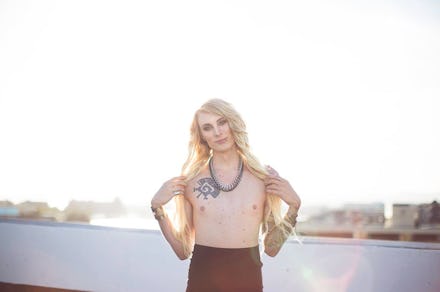How This Trans Woman Is Making #FreeTheNipple As Inclusive As Possible

Courtney Demone is a trans woman currently undergoing hormone replacement therapy and, as such, is starting to grow breasts. This experience, she wrote in a Mashable essay published Wednesday, has led her to realize the power of #FreeTheNipple in a new way — and how it can truly benefit others.
"When people start to consistently see me as a woman, my privilege to be comfortably topless in public will be gone for good," she writes. "We can challenge that."
Demone's solution? She's launching the hashtag #DoIHaveBoobsNow and will post topless images of herself on social media platforms like Facebook and Instagram. She will do so, she writes, "until those networks decide that my breasts have developed enough to be sexualized and worthy of censorship" or, ideally, change their policies.
A history of censorship: As Mic's Zak Cheney-Rice reported earlier this year, gender-nonconforming performance artist Jason Green's photos were removed from Facebook in June because of a sensuous nipple peaking out of Green's top. While Facebook allows users to choose from a very long list of gender identities, the network still decides which nipples must be censored based on the male/female binary.
"It's decent on a surface level that Facebook has recognized there's not a gender binary," Jenn Pozner, founding director of Women in Media and News, told Mic in June. "But their community standards still show all kinds of binary thinking."
Why it matters: In the context of transitioning visibly from male to female, and the many types of losses of privilege, Demone noted the fact that she doesn't feel as comfortable as she once did being topless is not the most jarring loss of privilege, but it's still an example of "sexism that comes with living in a female body."
Before she came out, Demone said, she rarely ever felt unsafe in public. "Now, it happens almost every time I leave the house," she writes. "It's my femininity, not my being transgender, that has brought about much of this privilege loss, and it's misogyny that robs women of these privileges."